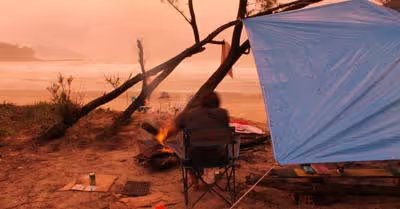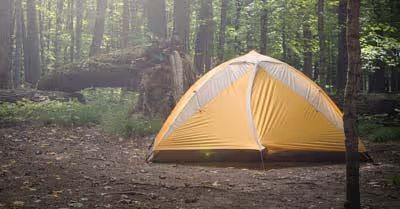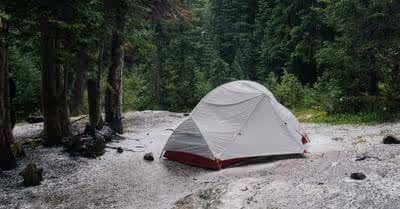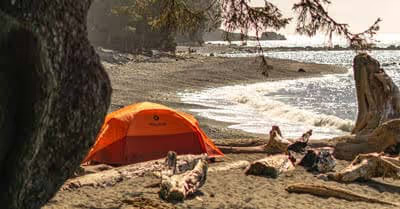Table of Contents
Do you need a sleeping pad for camping?
A cot is more comfortable than a sleeping pad because it holds your body above the ground, protecting you from cold and from any rocks that might be underneath your tent. Depending on how much room you have, a cot might be a better idea.
You can fold a camping cot up, and they are made to fit into as small of a space as possible. You can even buy cots designed for backpackers, which are even smaller and lighter than camping cots.
On another level, weight and not just space might be an issue. If weight is an issue, then sleeping pads are the best choice because a sleeping pad may weigh only one pound.
A camping cot, on the other hand, is a foldable bed that might weigh as much as 15 or 30 pounds. You can fold it up to a smaller size than you might think but go with a sleeping pad if weight is a big issue.
If you get a backpacking cot instead of a typical camping cot, you might be able to find a cot that weighs only three or four pounds. These are somewhat flimsy and not as comfortable as typical camping cots, but many people still prefer them to sleeping pads.
Aren't sleeping pads comfortable enough?
Not always. Whether or not a sleeping pad is enough depends on whether or not that ground your tent is on is completely free of rocks and bumps or not. If you find an excellent spot to pitch your tent, you might be fine with a sleeping pad, but you will get uncomfortable if the ground is less than ideal.
Cots are better than sleeping pads if you have back problems
Someone with back problems might still be able to enjoy the outdoors if they take the right precautions. If a sleeping pad worsens your back pain, you might find a cot much better to sleep on.
Some cots are wider than others, but most camping cots are narrow. Wider cots are the most comfortable, but there is only so much room in a tent. If you have back pain, you might be able to spare the room for a wider cot.
Is it a hassle to set a camping cot up?
No, you should be able to open them up on the first try without having used a folding camping cot before. If you want, you can fold and unfold your cot before you take it on the trip to make sure you know how to do this. Setting up a camping cot is similar to setting up a camping table.
What might take a bit more effort is putting your camping cot together if it does not come fully assembled. If you order it online, some assembly might be required. This is usually simple, but it might take a little longer.
Some camping cots have locks for the legs, which you might have to lock and unlock yourself. For others, the legs lock in place automatically when you unfold the cot fully.
Do sleeping pads have any advantages over cots?
One advantage that sleeping pads have over cots is that you can adjust them - more or less air pressure, depending on what feels most comfortable. Some of the more expensive, higher-end sleeping pads are comfortable enough that some people might prefer them to cots.
Can you sleep on the floor of a tent without a sleeping pad?
It depends on how easily you get to sleep and how numb to discomfort you are. Some people can sleep on the ground and think nothing of it. Other people won't be able to get to sleep, will wake up at night, or will wake up sore.
Remember that there could be rocks on the ground - even if you are insensitive, lying on rocks is going to annoy you. Sleeping pads are cheap and take up little space; there is little reason not to bring one.
Sleeping pads also protect you from the cold. Even in warm weather, the ground is going to be cold at night. Without a sleeping pad, the ground is going to make you cold and uncomfortable.
Can you use anything else as a sleeping pad?
Usually not. People who try using yoga mats or anything else as sleeping pads find that they do not protect them from bumps in the ground or from cold.
Sleeping pads are usually cheap and work much better than anything you could substitute for one. If anything works as a substitute for a sleeping mat, it is a thick gym mat.
Are sleeping pads a better choice if you are backpacking?
Absolutely. A cot is too large and heavy to carry around if you are moving from one campsite to another. Only if you are staying at the same campsite for a long time and not carrying gear around is a cot a better idea.
Is it a good idea to put a sleeping pad on top of a cot?
Yes, if space is not an issue, putting a sleeping pad on top might be a good idea. The cot will keep you off of the ground, away from the cold, and the sleeping pad will give you another soft layer to lie on.
Are air beds another alternative?
Yes, but most people do not bring them camping because they are too bulky. If you have enough room, they are more comfortable than either sleeping pads or cots. They do make relatively small and waterproof air mattresses that are for camping, but they are still too large for most people.
What other alternatives are there to cots and sleeping pads?
If you are camping in a tent, you might use gym pads (these might be thick enough to work), or you might lie on top of a thick blanket. If you are not bringing a sleeping pad or a cot for whatever reason, bringing an extra blanket to lie on might do something. However, gym pads, yoga pads, and blankets do not work as well as cots or sleeping pads.
Camping in a hammock rather than a tent
Instead of camping in a tent, you might choose to camp in a hammock. If you put a tarp over you, you might not need a tent at all.
Camping in a hammock is great when the weather is too hot. On a hot summer night, the wind will keep you cool. If you are worried about bugs, a tent is better - even if you can close up your hammock, a lot of bugs may get through it.
Don't camp in a hammock unless the weather is reliably hot. On a cold night, being exposed to moving air will make you shiver and keep you up at night. Sleeping in a hammock can be comfortable in the right weather if you have lots of blankets with you.
Are cots the best choice?
For most camping trips, yes, a cot is the best choice. It is the same middle ground between a sleeping pad that might be too inadequate and an air mattress that is usually too bulky and heavy. You should know a little about cots before you buy one.
Any cot has a weight limit. If you exceed it, the cot will break, so check the weight limit first. You can store some belongings under your cot, so get a cot that is raised relatively high above the ground.
Most cots also come with accessories that you might be interested in. Some of them have pockets for storage, which are convenient because they help you keep your gear organized. Some camping cots also have small tables that fold out on the sides.
Before you take a cot with you, you might want to set it up at home and leave it set up for a day or two before you pack it up. This will give the fabric some time to stretch and make it easier to set the cot up the next time.
Another thing that can be said in favor of cots is that an inflatable sleeping pad is delicate. An inflatable sleeping pad can get a hole in it - you might be able to patch it if you have a repair kit, but you might be unable to fix it. For most people, cots are the right way to go.
Recent Articles
















